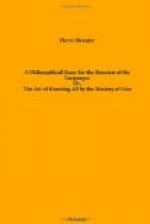As to its proportion, it in a manner keeps a mean between the Ancient and Modern Languages, it is neither altogether so pure as the one, nor so corrupt as the other, and so with the same ease is applicable to both; and in earnest is infinitely the most compendious, it being farre less trouble to passe from the mean to an extream, or from the extream to the mean, then to trace it from one extream to another. However this would seem incommodious beyond all redresse, to attempt to reduce all the Languages, either to the most ancient, or else to any one of the most modern, because in reality, the former have no more relation to the later, then these have with others of the same age, which have been as so many channels to derive Antiquity to us.
Besides the Latin makes a friendly meeting between the Eastern, and Western Languages; as to the first alone it owes its birth and life, so the others do to it.
It seems then no more difficult to attain the one, by streaming it up to the fountain, then to gain all the rest by making a like descent, by way of resemblance to what we observe in nature when we discern, as well the effect by the cause, as the cause by the effect. In one word, to make up all the differences that may arise about the supremacie of the Languages, I consider the Latin under three different regards, as the daughter of the Languages of the East, as the Mother of those in the West, and as the Sister of the more Northerne.
As it is abundantly copious, and rich, having been refind, and improv’d for more then 3000 years by an infinite variety of nations, with whose spoyls it is now invested, so it may have a very great number of resemblances, under which with little difficultie it will admit of a reference to all the rest. For in conclusion, to reduce all to the most refin’d, and polite Language, is not what I pretend to; the Barbarous stile of the ancient Romans will do me as much service, as the quaintnesse, and elegance of Cicero; the Latin of the declining Empire, since the irruptions of the Northern Nations, may be admitted into this designe to as good purpose, as the language of Augustus his time; any sense is the same of that of the Sciences, which makes one almost altogether distinct from what is common and vulgar; the proper names of Philosophy, naturall History, and Divinity, those of Physick, and the Mathematicks, of Arts, Law, and Commerce; the names of illustrious persons, people and places, of which History furnisheth us with a plausible account, will afford me no lesse assistance on this occasion, then the names of things that are most common.




